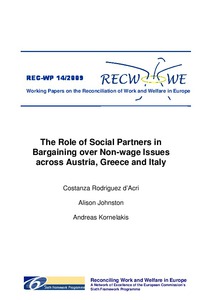The role of social partners in bargaining over non-wage issues across Austria, Greece and Italy
"Flexible specialisation, internationalisation, an ageing workforce, and the move into a service economy has placed growing pressure on trade unions and employers to strike new deals. Bargaining over ‘non-wage’ issues may potentially accommodate the needs of an ageing and increasingly feminised...
| Main Authors: | , , |
|---|---|
| Institution: | ETUI-European Trade Union Institute |
| Format: | TEXT |
| Language: | English |
| Published: |
Edinburgh
2009
RECWOWE |
| Subjects: | |
| Online Access: | https://www.labourline.org/KENTIKA-19185229124919034019-The-role-of-social-partners-in.htm |
| _version_ | 1771659900308422656 |
|---|---|
| author | RECWOWE Rodriguez d'Acri, Costanza Kornelakis, Andreas |
| author_facet | RECWOWE Rodriguez d'Acri, Costanza Kornelakis, Andreas |
| collection | Library items |
| description | "Flexible specialisation, internationalisation, an ageing workforce, and the move into a service economy has placed growing pressure on trade unions and employers to strike new deals. Bargaining over ‘non-wage’ issues may potentially accommodate the needs of an ageing and increasingly feminised workforce and enable unions to increase or at least maintain given levels of membership. Little empirical work has been done, however, in examining different types of ‘non-wage’ issues that have arisen across countries and explaining why they arise. In this paper, we create a typology of four distinct types of ‘non-wage’ issues and seek to identify the conditions under which each is expected to be observed. We propose that two conditions (one political and one economic) determine different agendas which lead to the emergence of a particular type of ‘non-wage’ issue: the level of cohesion amongst unions; and the sector in which bargaining predominates (private or public). We then focus on how the bargaining over ‘non-wage’ issues has developed within three European economies: Austria, Greece and Italy. Each is representative of a different variant of corporatism, and therefore we look at the ability of social partners with variable institutional capacity to negotiate and agree on ‘non-wage’ issues through collective bargaining. Our initial findings suggest that union cohesion and the presence, or the lack, of a market constraint on employers helps explain the variation in the types of non-wage issues which arise in these three countries." |
| format | TEXT |
| geographic | Austria Greece Italy |
| id | 19185229124919034019_61ac4f61758642da8910ce353c0d0b43 |
| institution | ETUI-European Trade Union Institute |
| is_hierarchy_id | 19185229124919034019_61ac4f61758642da8910ce353c0d0b43 |
| is_hierarchy_title | The role of social partners in bargaining over non-wage issues across Austria, Greece and Italy |
| language | English |
| physical | 29 p. Digital |
| publishDate | 2009 |
| publisher | Edinburgh RECWOWE |
| spellingShingle | RECWOWE Rodriguez d'Acri, Costanza Kornelakis, Andreas collective bargaining comparison equal rights private sector public sector social partners trade union role working time The role of social partners in bargaining over non-wage issues across Austria, Greece and Italy |
| thumbnail | https://www.labourline.org/Image_prev.jpg?Archive=115884693306 |
| title | The role of social partners in bargaining over non-wage issues across Austria, Greece and Italy |
| topic | collective bargaining comparison equal rights private sector public sector social partners trade union role working time |
| url | https://www.labourline.org/KENTIKA-19185229124919034019-The-role-of-social-partners-in.htm |

